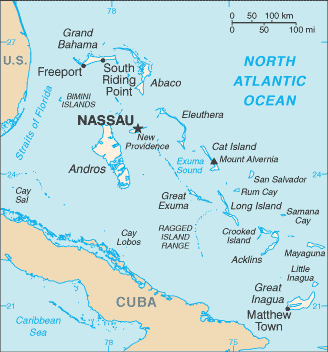|
Bahamas, The
|

|
Capital: Nassau
Population: 389,482
Brief History of Bahamas, The:
The Bahamas were first settled by peoples from nearby islands. These people were called the Lucayans. In 1492 Christopher Columbus discovered America when he landed on the island of San Salvador in the Bahamas. Unfortunately for the local people, he brought the disease of smallpox which would kill nearly half of the population. Later, Spanish slave traders would capture the Lucayans to work in gold mines. Twenty five years after Columbus' arrival, it is thought that all the locals were gone or dead.
The first permanent settlement on the Bahamas was founded in 1647 by a group of religious refugees. More settlers came over time and the Bahamas became a British Colony in 1717. The first Royal Governor was English sea captain and privateer Woodes Rogers.
The Bahamas became a place for pirates to hide and hang out. Famous pirates such as Blackbeard and Sir Francis Drake were known to hide out in the Bahamas. There were many coves and places for pirates to hide. In addition, the islands were close to shipping lanes that the pirates could plunder for treasure.
The Bahamas became an independent country on July 10, 1973. Since independence, the Bahamas has developed into a major center for financial services as well as a prime tourist spot.
The Geography of Bahamas, The
Total Size: 13,940 square km
Size Comparison: slightly smaller than Connecticut
Geographical Coordinates: 24 15 N, 76 00 W
World Region or Continent: Central America
General Terrain: long, flat coral formations with some low rounded hills
Geographical Low Point: Atlantic Ocean 0 m
Geographical High Point: Mount Alvernia, on Cat Island 63 m
Climate: tropical marine; moderated by warm waters of Gulf Stream
Major cities: NASSAU (capital) 248,000 (2009)
The People of Bahamas, The
Type of Government: constitutional parliamentary democracy
Languages Spoken: English (official), Creole (among Haitian immigrants)
Independence: 10 July 1973 (from UK)
National Holiday: Independence Day, 10 July (1973)
Nationality: Bahamian(s)
Religions: Baptist 35.4%, Anglican 15.1%, Roman Catholic 13.5%, Pentecostal 8.1%, Church of God 4.8%, Methodist 4.2%, other Christian 15.2%, none or unspecified 2.9%, other 0.8% (2000 census)
National Symbol: blue marlin; flamingo
National Anthem or Song: March On, Bahamaland!
Economy of Bahamas, The
Major Industries: tourism, banking, cement, oil transshipment, salt, rum, aragonite, pharmaceuticals, spiral-welded steel pipe
Agricultural Products: citrus, vegetables; poultry
Natural Resources: salt, aragonite, timber, arable land
Major Exports: mineral products and salt, animal products, rum, chemicals, fruit and vegetables
Major Imports: machinery and transport equipment, manufactures, chemicals, mineral fuels; food and live animals
Currency: Bahamian dollar (BSD)
National GDP: $10,600,000,000
** Source for population (2012 est.) and GDP (2011 est.) is CIA World Factbook.
Back to Geography Home Page
